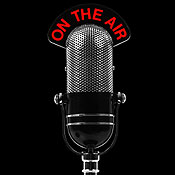Five Ways You Can Become A Great Radio Guest
Washington, D.C.’s WTOP is the top-ranked radio station in the nation’s capital.
I’ve been fortunate to appear on WTOP a few times over the past month to discuss Anthony Weiner (audio here) and the News of the World scandal (audio here). In the process, I’ve gotten to know WTOP reporter and producer Ari Ashe.
I asked Ari to come up with a list of five things great radio guests do – and five things lousy radio guests do. Today’s post will focus on the five things radio guests do well; tomorrow’s will focus on the things they do poorly. I hope you enjoy his lists as much as I did.
1. They’re Calming: Most people have stress. They’re listening to the radio with a shouting child, bumper-to-bumper traffic, and a pile of bills waiting at home. We’re fighting to get their attention. There’s no better way to lose it fast than to become alarmists. People are looking to us, and you, for information and solutions. People don’t want doom and gloom, they want to hear how to make good decisions and how to solve their problems. Guests who can provide good information with a calming voice will connect with listeners.
2. They’re Energetic: Think about your experience at school. What made one teacher good and another bad? What type of a lecture will you remember better: a dry recitation of the textbook or an interactive lecture with illustrations and interaction? Clearly the latter. A good interview is no different. You’re trying to teach the listeners. Perhaps you’re teaching them how to make a wise choice. Perhaps you’re teaching them how a news event is relevant to their lives. Listeners will remember what you have to say when you deliver it with energy. Listen to yourself when you talk to your spouse or friends. How much energy is in your voice? Speak that way on-air.
3. They Give Short But Full Answers: How do speak to your spouse or friends? Listen to yourself. I can’t imagine there are too many people that speak in long five minute answers to their spouses or friends. It’s informal. Answers are usually about 30-40 seconds. Maybe, maybe, you go a minute at most! Radio is no different. No one wants to hear a speech. People want to hear an informal, interactive forum with back-and-forth conversation. Treat an interview as such.
4. They Express Complex Information Simply: Most experts say the way to retain information is to develop some personal connection to it. If you want to be a good radio guest, you must always remember the most important question: How is this topic relevant to the listeners? If you can teach your students (the listeners) in a simple way, in a way that connects to their personal lives, you’ve won. The listeners will retain the information and use it for practical purposes. Remember “KISS,” the old pneumonic device? Keep it Simple, Stupid.
5. They’re Friendly: When you feel comfortable, you set a positive tone. When an interview and interviewee can go back and forth informally, that chemistry makes the interview better.
Ari Ashe blogs here, tweets here, and can be found on Facebook here. You can listen live to WTOP here.
Do you like these types of tips? Please join our mailing list to receive monthly tips to help you improve your media interviews and speeches. Sign up box is in on the upper right corner.
Related: Part Two: Five Ways To Avoid Being a Terrible Radio Guest




